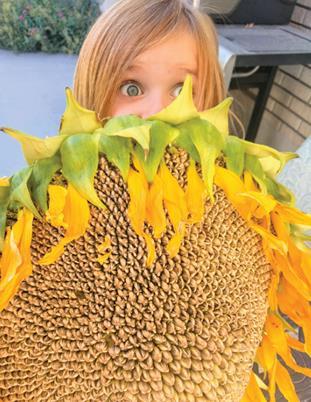
4 minute read
Grow gardening


Advertisement

By Brooke Loeffler Redmond Minerals
amily gardens can simultaneously be our classroom, battlefield, therapist office, grocery store, gym, security blanket, and so much more. Get the whole family involved, and you have created an opportunity for everyone to grow!
Benefits of Gardening with Kids
In our fast-paced, technology-driven world, it is becoming increasingly important to find meaningful activities that promote family togetherness and foster a connection with nature. Families of all sizes can reap many benefits from gardening together.
Strengthen Fine and Gross Motor Skills
Gardens are a great place to learn and practice locomotor skills. Gross motor (involving large movements and muscle groups) and fine motor skills (involving small movements and appendages) are strengthened as kids pull up weeds, pinch and distribute seeds, use tools, and more.
Boost Immune Health
Being outside in the dirt and sunshine can have natural immune boosting benefits. The University of Vermont has found that “exposure to soil microbes, particularly in childhood, helps to build a more robust immune system and resistance to asthma and allergies.”
Plus, the added sunshine and vitamin D is great for the whole family. The National Institute of Health reports that vitamin D deficiencies increase autoimmune problems and susceptibility of infection.
Better Diet Diversity
One of the best ways to help encourage picky eaters to try new things is for them to get their hands dirty growing their own food. Michigan State University says that “children are often more willing to try a new food if they have been involved in the process of growing it.”
Sensory Stimulation
Gardens are an explosion of light, color, texture, taste, sound, and scent. Stimulating all of those sense centers is wonderful for brain development and mental health for all ages.
Environmental Stewardship
Kids that are actively engaged in taking care of a small plot of land (and the plants and animals that live there) are more likely to care for the wide world around them. In the garden, they learn to be more mindful about nature and make more responsible choices later in life as they hike, visit state and national parks, interact with animals, and make purchase decisions.
Family Bonding
Taking a break from screens and busy schedules to garden is a wonderful way for a family to slow down, communicate, and work together. Gardens are places where memories are made, problems are solved, patience is practiced, and successes are celebrated.
Hands on Learning
Few places are as well equipped for hands-on learning than a garden. Here, children can learn how to:

▪ BUILD: trellises, growing supports, watering systems, sheds, greenhouses, hoop houses, raised beds, etc.
▪ OBSERVE: learn about life cycles, ecosystems, chemistry, plant and animal reproduction, weather patterns, seasonal changes, the water cycle, etc.
▪ READ: seed packets, planting instructions, soil amendment packaging, etc.
▪ ANALYZE: predict outcomes, creative problem solving, learn responsibility, observe cause and effect, etc.
▪ CALCULATE: manage growing calendars, compute amendment ratios, measure planting layout, etc.
Healthy Gardens Start with Healthy Soil
The soil beneath your feet is a complex and dynamic ecosystem that is continuously working to break down minerals and nutrients so your plants can use them.
Nurturing this ecosystem will help you:
▪ Grow more nutrient dense plants
▪ Increase your harvests
▪ Improve your success rate
▪ Invest in the future health of your garden
Test Your Soil
Avoid the waste of blindly buying and applying soil amendments you may not even need! Using a soil test kit will give you the best idea as to where to begin and how to garden sustainably. Thorough test kits should tell you:
▪ pH levels
▪ Macronutrients
▪ Micronutrients
▪ Nutrient density score
▪ Instructions on which products to use
▪ Application rates (to avoid over and under applying)
Remember, that even amended soil naturally returns to its original condition over time, so testing yearly is recommended.
Create Nutrient Reserves
Make sure your soil can store essential nutrients for when your plants need them most. This storage system is called your soil’s cation exchange capacity (CEC). CEC is a very useful gauge for soil fertility, because if the soil is efficiently storing cations, plants have access to the nutrition they need. A plant can then trade for the nutrients it can’t produce with hydrogen cations it can produce. This exchange is continually taking place between the roots and the negatively charged particles in the soil. Here are some amendments and best practices you can use to increase your soil’s CEC levels:
▪ Avoid overwatering and runoffuse drip systems, or smart watering devices that reduce nutrient leaching
▪ Apply amendments that increase CEC levels- lime, clay conditioners, and organic matter (like compost, mulch, humates/humic acid, etc.)
Brooke Loeffler is a content writer and designer for Redmond Minerals
Support Soil-Based Bacteria
Maintaining healthy soil bacteria is one of the most important steps you can take to get the most out of your garden. These colonies need to be actively metabolizing nitrogen and other nutrients so they can keep your soil’s nitrogen cycle moving. Increasing your soil’s electrical conductivity (EC) with sea minerals will stimulate bacteria colony growth and keep those little nitrogen factories going.
Happy Growing!
Remember that a successful garden looks different for every single one of us. Ask yourself why you are gardening this year and what do you hope to get out of it?
✓ Family bonding
✓ Fewer trips to the grocery store
✓ Greater food security/emergency preparedness
✓ Physical and mental health benefits
✓ Healthier eating habits
✓ Trading and/or giving homegrown food to others
✓ Selling harvests for profit
✓ Other gardening benefits
To dive deeper into more helpful homesteading topics, visit: blog.redmondagriculture.com
Instagram: redmondhomesteader
Regardless of your “why”, I hope you find some measure of success and the encouragement to add to your growing efforts each year!











